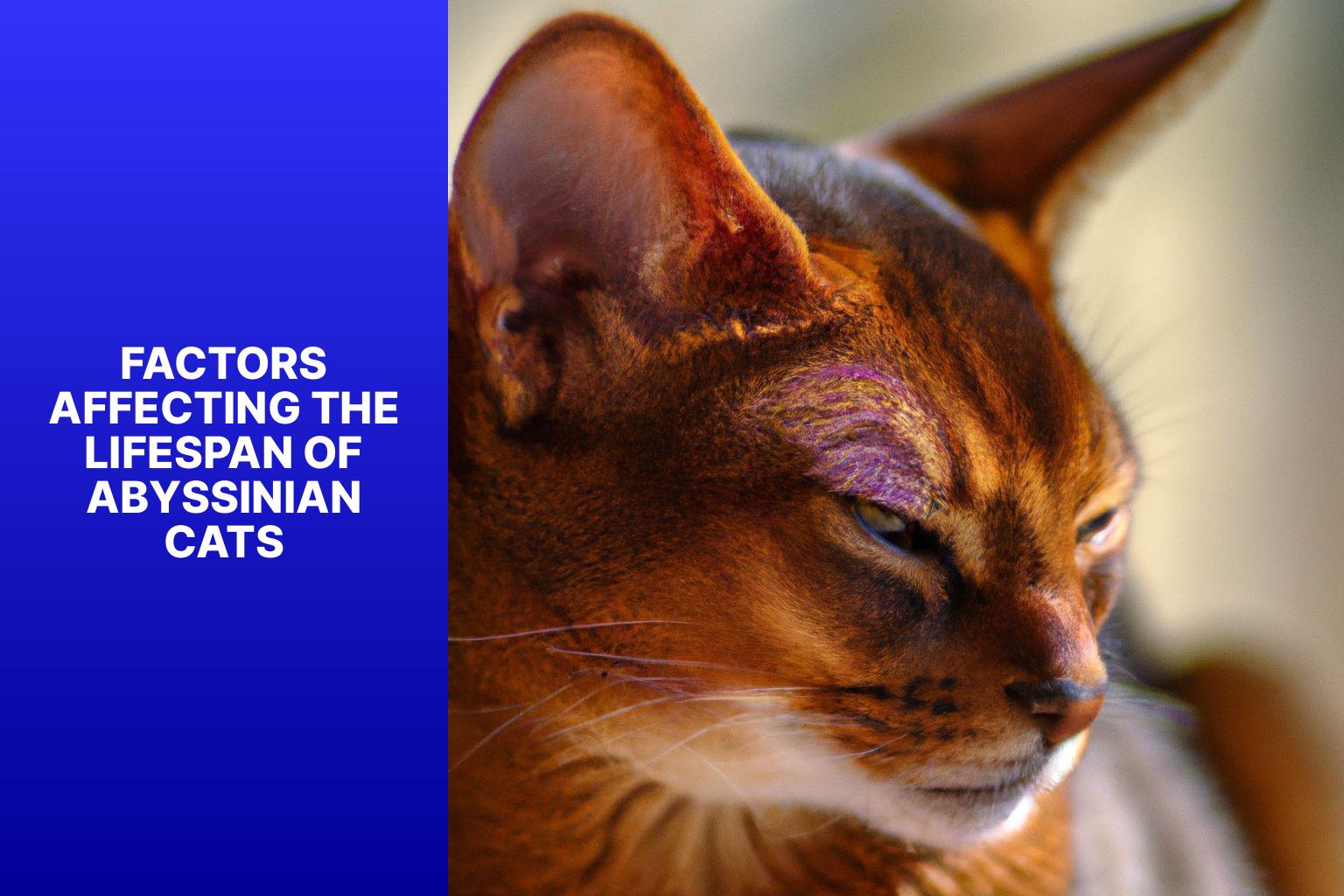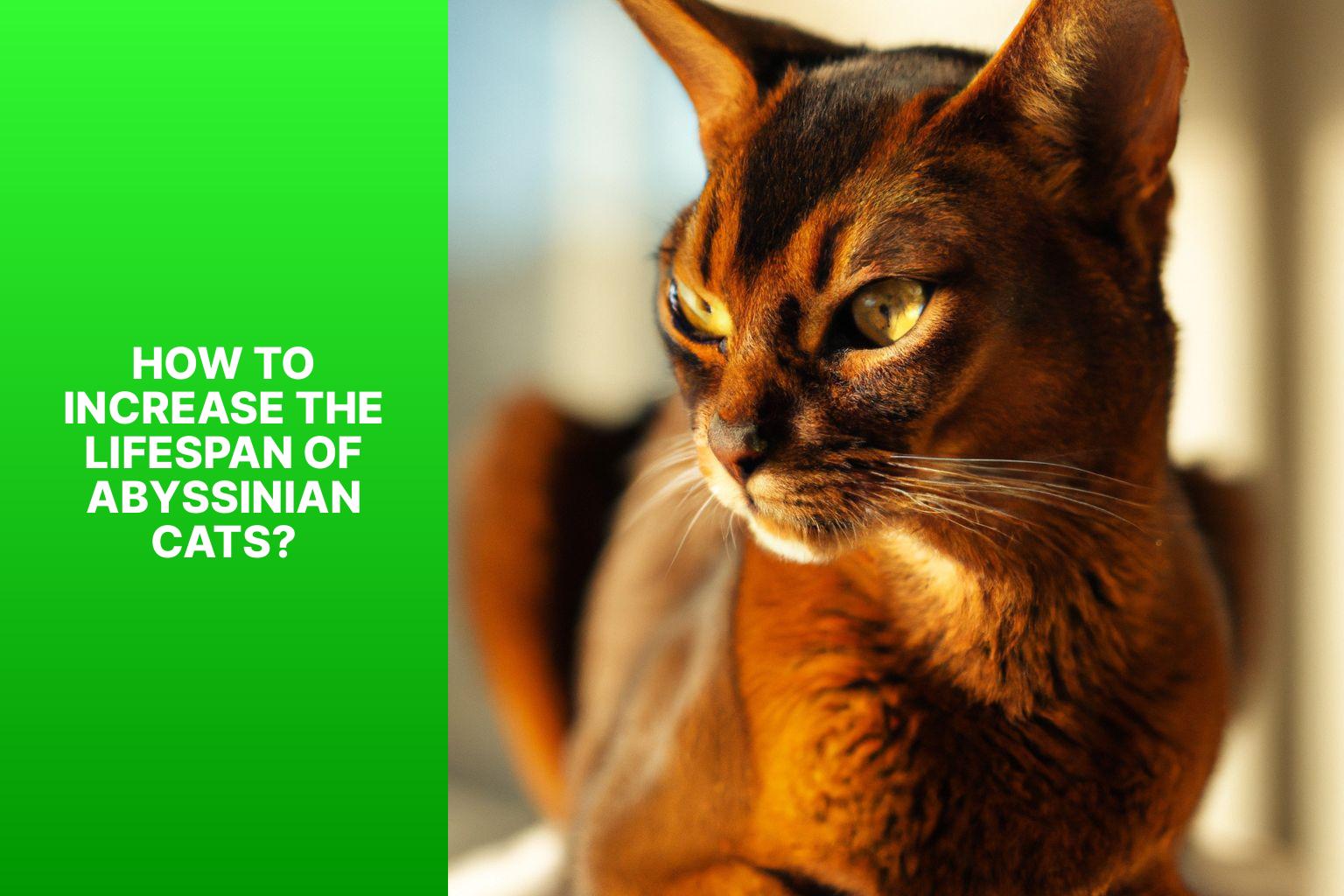Abyssinian cats are a popular and unique breed known for their beautiful coat, playful nature, and intelligence. If you are considering adopting an Abyssinian cat, it’s important to understand their lifespan and the factors that can affect it.
What Is the Lifespan of Abyssinian Cats?
The average lifespan of an Abyssinian cat is around 9 to 15 years. With proper care and attention to their specific needs, they can live even longer.
Factors Affecting the Lifespan of Abyssinian Cats
Several factors can influence the lifespan of Abyssinian cats, including genetics, diet, exercise, veterinary care, and environmental factors.
1. Genetics and Breed: Genetics play a significant role in determining the lifespan of cats. Abyssinians with a healthy genetic background are more likely to live longer.
2. Diet and Nutrition: Providing a balanced and nutritious diet is crucial for the overall health and longevity of Abyssinian cats. Feeding them high-quality cat food and avoiding excessive treats can help prevent health issues.
3. Exercise and Physical Activity: Keeping Abyssinians active and providing regular exercise can help maintain their overall fitness and prevent obesity-related health problems.
4. Regular Veterinary Care: Scheduling regular check-ups with a veterinarian is essential for early detection and prevention of potential health issues. Vaccinations, deworming, and dental care are also important aspects of their healthcare routine.
5. Environmental Factors: Providing a safe and stress-free environment is crucial for the well-being of Abyssinian cats. Minimizing exposure to toxins, providing proper shelter, and enriching their surroundings can contribute to a longer and healthier life.
How to Increase the Lifespan of Abyssinian Cats?
To increase the lifespan of Abyssinian cats, it’s important to provide them with proper care and attention.
1. Balanced Diet: Offer a balanced and species-appropriate diet that meets their nutritional needs.
2. Regular Veterinary Check-ups: Schedule regular visits to the veterinarian for check-ups, vaccinations, and preventive care.
3. Hydration and Fresh Water: Ensure they have access to fresh water at all times to prevent dehydration, which can lead to various health issues.
4. Exercise and Enrichment: Provide opportunities for physical activity and mental stimulation through playtime and interactive toys.
5. Stress Reduction: Minimize stressors in their environment and provide a calm and secure space for them to thrive.
By understanding the factors that can influence the lifespan of Abyssinian cats and implementing appropriate care strategies, you can ensure that your furry friend has a happy and healthy life by your side.
Key takeaway:
- Abyssinian cats have a lifespan influenced by various factors: The lifespan of Abyssinian cats can be affected by genetics, diet, exercise, veterinary care, and environmental factors.
- Proper care can increase the lifespan of Abyssinian cats: Providing a balanced diet, regular veterinary check-ups, ensuring hydration with fresh water, regular exercise and enrichment, and reducing stress can help increase the lifespan of Abyssinian cats.
- Abyssinian cats are prone to certain health issues: Owners should be aware of common health issues in Abyssinian cats and take preventive measures to ensure their well-being.
What Is the Lifespan of Abyssinian Cats?
The lifespan of Abyssinian cats is usually 12 to 15 years. Abyssinians are generally healthy with few genetic health issues. Like all cats, they can still develop common age-related ailments like dental disease and arthritis. To ensure their well-being and longevity, they should receive regular veterinary care and a balanced diet. Regular exercise and mental stimulation are also important for their physical and mental health.
To enhance their well-being, it is recommended to spay or neuter Abyssinians to prevent health issues and behavioral problems. Providing a safe and stimulating environment with opportunities for play and exploration helps cultivate their natural instincts and keep them active. Social interaction with their human companions and opportunities for affection and companionship also contribute to their happiness and well-being. By providing proper care and attention, Abyssinians can live a fulfilling and healthy life for many years.
Factors Affecting the Lifespan of Abyssinian Cats
Photo Credits: Www.Catcornerblog.Com by Jordan Lewis
Factors affecting the lifespan of Abyssinian cats are not to be taken lightly! From genetics and diet to exercise and environmental factors, numerous aspects contribute to the long and healthy life of these feline companions. In this section, we’ll investigate how each of these elements influences the lifespan of Abyssinian cats. Get ready to uncover the secrets behind their longevity and discover what it takes to ensure these magnificent creatures thrive for years to come!
1. Genetics and Breed
Abyssinian cats’ lifespan can be influenced by their genetics and breed. Understanding their genetics and breed-specific needs is essential to provide them with the best care possible. Certain genetic factors can impact their health and longevity, so responsible breeders carefully select pairs to minimize the risk of inherited genetic diseases. When choosing a breeder, prioritize their cats’ health and ensure they conduct regular genetic testing. This can help identify potential health concerns early on and ensure the cats receive necessary care and attention. Along with regular veterinary check-ups, providing a balanced diet and regular exercise is crucial for their well-being. By taking these measures, we can help Abyssinian cats lead long and healthy lives.
2. Diet and Nutrition
Proper diet and nutrition are essential for the lifespan of Abyssinian cats. When it comes to the diet of Abyssinian cats, there are a few key points to consider. First and foremost, it is important to provide them with a well-balanced diet. This means including high-quality animal-based protein sources such as chicken, fish, or turkey, while avoiding foods that are high in carbohydrates, fillers, or additives.
Another crucial aspect of their nutrition is ensuring adequate hydration. Abyssinians should always have access to fresh water, as it is vital for their overall health and digestion.
Incorporating essential nutrients into their diet is also important. This means giving them a diet that includes all the essential vitamins and minerals they need to support their immune system, maintain a healthy skin and coat, and promote overall well-being.
Controlling portion sizes is another important factor when it comes to their diet. This helps prevent obesity and related health issues. It is advisable to follow feeding guidelines or consult a veterinarian to determine the appropriate portion sizes for your Abyssinian cat.
Regular vet check-ups are also crucial. These visits allow for the monitoring of your cat’s weight, overall health, and nutritional needs. Your veterinarian can provide guidance on necessary diet adjustments or supplements if needed.
By following these guidelines, you can ensure that your Abyssinian cat receives the necessary nutrients for optimal health and longevity.
3. Exercise and Physical Activity
Exercise and physical activity play a vital role in maintaining the health and well-being of Abyssinian cats. They contribute to maintaining a healthy weight, strengthening muscles, and improving cardiovascular health. When it comes to an Abyssinian cat’s exercise routine, here are some essential points to keep in mind:
1. Provide ample opportunities for play: Abyssinian cats are naturally playful creatures. Encouraging active playtime with toys, interactive games, and scratching posts is essential. This not only satisfies their instincts but also promotes physical activity.
2. Engage in interactive play sessions: It is crucial to set aside dedicated time each day to play and interact with your Abyssinian cat. Using toys such as balls, laser pointers, or items that stimulate agility and coordination will keep them engaged and active.
3. Encourage vertical exercise: Abyssinians have a natural inclination towards climbing and exploring. To promote muscle strength, it is beneficial to provide them with tall cat trees or shelves where they can climb and jump.
4. Consider supervised outdoor time: If it is safe and secure, allowing your Abyssinian cat access to an outdoor space can provide additional exercise and stimulation. Ensure that there are no potential dangers present.
In addition, it is essential to remember that each Abyssinian cat may have different exercise preferences and energy levels. By observing their behavior, you can adjust the exercise routine accordingly. Providing a variety of exercise options will keep them mentally and physically stimulated, resulting in a happy and healthy Abyssinian cat.
4. Regular Veterinary Care
Regular veterinary care is essential for the well-being and longevity of Abyssinian cats. Here are some important considerations:
1. Annual check-ups: Schedule regular visits to the veterinarian once a year, or more frequently for senior cats. These check-ups detect health issues early.
2. Vaccinations: Abyssinian cats should follow the recommended vaccination schedule to protect against common infectious diseases.
3. Parasite prevention: Regularly deworm and use flea/tick prevention treatments to keep Abyssinian cats healthy and parasite-free.
4. Dental care: Maintain good oral health and prevent dental diseases through regular dental check-ups and professional cleanings.
5. Spaying or neutering: This surgical procedure is recommended for non-breeding Abyssinian cats to prevent reproductive health issues and unwanted behaviors.
6. Health monitoring: Regular veterinary care includes monitoring weight, overall health, and changes in behavior or appetite that could indicate underlying health problems.
7. Emergency care: Access to emergency veterinary care is crucial for prompt treatment and the best chance of recovery in case of accidents or sudden illness.
By ensuring regular veterinary care, Abyssinian cat owners can provide preventive measures and early interventions that significantly contribute to their cat’s health and lifespan.
5. Environmental Factors
Environmental factors have a significant impact on the lifespan and well-being of Abyssinian cats. Here are five key environmental factors to consider for your Abyssinian cat’s long and healthy life.
Deciding between indoor or outdoor living can greatly influence their lifespan. Keeping Abyssinian cats indoors protects them from accidents, predators, and harmful substances, ultimately leading to longer lives.
Creating a safe and stimulating environment is also vital. Providing toys, scratching posts, hiding spots, and mental and physical exercise opportunities increases the chances of a longer life for your Abyssinian cat.
It is crucial to avoid exposing them to toxins. Household cleaners, pesticides, and certain plants can be detrimental to their health. By keeping these substances out of their reach, you can protect your Abyssinian cat from potential harm.
Adequate climate control is another important aspect to consider. Maintaining a comfortable living environment with proper temperature and humidity levels is essential for the well-being of Abyssinian cats.
Reducing stress levels is crucial for their overall health and lifespan. High levels of stress can negatively affect Abyssinian cats. To create a calm and stress-free environment, it is important to establish a routine, provide predictability, and offer a quiet space for them.
By taking these environmental factors into consideration and addressing them, you can help ensure a long and healthy life for your beloved Abyssinian cat.
How to Increase the Lifespan of Abyssinian Cats?
Photo Credits: Www.Catcornerblog.Com by Alexander King
Looking to extend the lifespan of your Abyssinian cat? Look no further than this section, where we’ll discuss five key aspects that can make a real difference. From ensuring a balanced diet and regular veterinary check-ups to promoting hydration, exercise, and stress reduction, we’ve got you covered. By incorporating these practices into your feline friend’s life, you’ll be setting them up for a long, happy, and healthy journey.
1. Balanced Diet
A balanced diet is crucial for Abyssinian cats’ overall health and well-being. When it comes to providing a balanced diet for your Abyssinian cat, there are a few key considerations to keep in mind.
It is important to choose high-quality cat food. Opt for a reputable brand that offers complete and balanced nutrition specifically formulated for cats. This will ensure that your cat gets all the necessary nutrients they need.
Next, prioritize protein in your cat’s diet. Cats are obligate carnivores, meaning they require a diet rich in animal-based protein. Look for cat food that lists a high-quality source of animal protein, such as chicken or fish, as the primary ingredient.
In addition to protein, ensure that the cat food contains all the essential nutrients your Abyssinian cat needs. This includes vitamins, minerals, and amino acids, which are vital for their growth, energy, and overall health.
To prevent dehydration, it is important to increase your cat’s moisture intake. Cats have a low thirst drive and may not drink enough water on their own. Consider incorporating wet or canned cat food into their diet, as it can help prevent dehydration and provide additional hydration.
Maintaining portion control is also crucial for your cat’s health. Feeding the appropriate amount of food is essential for maintaining a healthy weight. Follow the recommended feeding guidelines provided by the cat food manufacturer and adjust as necessary based on your cat’s age, activity level, and body condition.
Remember, it is always a good idea to consult with a veterinarian to determine your Abyssinian cat’s specific dietary needs. They can help you establish a feeding routine that meets their individual requirements.
2. Regular Veterinary Check-ups
Regular veterinary check-ups are essential for responsible pet ownership. Professional care significantly contributes to the longevity and quality of life of Abyssinian cats. Prompt addressing of potential health issues prevents them from becoming more serious problems.
Routine vaccinations protect cats from infectious diseases, promoting overall well-being. Dental health assessments and treatments maintain a healthy mouth and prevent discomfort. Appropriate parasite prevention measures keep cats free from fleas, ticks, and internal parasites, safeguarding their health.
Prioritizing regular veterinary check-ups ensures that Abyssinian cat owners provide comprehensive care for their beloved pets, enabling them to live long, happy, and healthy lives.
3. Hydration and Fresh Water
Hydration and fresh water are essential for the health and well-being of Abyssinian cats. It is crucial to ensure that they have access to clean and fresh water at all times in order to maintain their hydration levels.
Cats require an adequate amount of water, so it is recommended to provide multiple water bowls throughout the house to encourage them to drink. It is important to regularly change the water to keep it fresh and appealing, as stagnant water can decrease their water intake.
Make sure that the water is clean and free from any contaminants. It is advisable to avoid using water with a strong odor, as cats may be reluctant to drink it. Offering a variety of water sources, such as water fountains or dripping faucets, can attract cats and encourage them to drink more.
It is also essential to be alert for signs of dehydration in your Abyssinian cat, which may include sunken eyes, a dry mouth, or lethargy. If you suspect that your cat is dehydrated, it is important to seek immediate veterinary attention.
Adequate hydration with fresh water not only supports organ function, digestion, and a healthy coat and skin, but it also enhances overall health and vitality. Therefore, it is crucial to provide clean and fresh water on a daily basis and to encourage water intake from various sources to ensure optimal hydration levels for your Abyssinian cat.
4. Exercise and Enrichment
Exercise and enrichment are essential for the overall well-being and longevity of Abyssinian cats. These highly active and energetic breeds require regular physical activity to prevent obesity and promote muscle tone. You can engage them in interactive play sessions using toys that stimulate their natural hunting instincts.
To further encourage their active play, create indoor play areas with climbing structures, scratching posts, and tunnels. Interactive puzzle toys that dispense treats can provide mental stimulation for Abyssinians.
Since Abyssinians are curious cats who love to explore, you can open windows or create a secure outdoor enclosure to create a safe space for them to satisfy their exploration needs.
To keep them mentally stimulated, provide a variety of toys such as puzzle feeders or treat-dispensing toys. Make sure to rotate toys regularly and introduce new ones to prevent boredom.
Engaging in interactive play sessions with your Abyssinian cat not only helps with physical exercise but also strengthens your bond and relationship with them.
It’s fascinating to know that Abyssinian cats have a rich history that dates back to ancient Egypt. They resemble the cats depicted in ancient Egyptian art and were highly revered and considered sacred by the Egyptians. Due to their unique coat color and striking ticked fur pattern, Abyssinians are widely recognized and loved as pets worldwide.
5. Stress Reduction
Stress reduction is vital for the well-being and longevity of Abyssinian cats. Here are some effective strategies to naturally alleviate stress in these cherished felines:
– Foster a calm environment: Minimize loud noises and sudden disruptions to create a peaceful and quiet home. Abyssinian cats flourish in serene surroundings.
– Provide designated hiding spots: Designate specific areas where your Abyssinian cat can retreat when feeling overwhelmed or anxious. These spaces can include cozy cat beds, covered boxes, or soft blankets.
– Encourage play and exercise: Engage your Abyssinian cat in regular play sessions using interactive toys or laser pointers. Physical activity helps divert their attention from stressors and releases mood-boosting endorphins.
– Establish a consistent routine: Abyssinian cats appreciate a predictable daily routine. Consistent mealtimes, play sessions, and sleep schedules aid in reducing their stress levels.
– Offer vertical spaces: Abyssinians love to climb and explore. Install cat trees or shelves at various heights to create vertical spaces for them to confidently observe their surroundings.
By incorporating these stress reduction techniques, you can contribute to your Abyssinian cat’s overall well-being and happiness, ensuring their long and fulfilling lives.
Common Health Issues in Abyssinian Cats
Common Health Issues in Abyssinian Cats
Abyssinian cats can be prone to certain health issues. Abyssinian cat owners should be aware of these common health problems. Here are some commonly observed health issues in Abyssinian cats:
1. Dental problems: Abyssinians have a predisposition to dental issues like periodontal disease and gingivitis. Regular dental care, including teeth brushing and professional cleanings, can maintain good oral health.
2. Hyperesthesia syndrome: This condition is characterized by increased sensitivity along the cat’s back. Abyssinians may show signs of twitching or over-grooming when experiencing this syndrome. Providing a stress-free environment and consulting a veterinarian for appropriate management is important.
3. Renal (kidney) disease: Abyssinians have a higher risk of developing kidney disease compared to some other cat breeds. Feeding a balanced diet, providing fresh water, and regular check-ups can help detect abnormalities early on.
4. Patellar luxation: This condition occurs when the cat’s kneecap dislocates from its normal position. Abyssinians may experience lameness or an abnormal gait. Consulting a veterinarian for diagnosis and treatment options is necessary.
5. Progressive retinal atrophy: This genetic condition causes progressive vision loss in cats. Regular eye examinations can help identify any abnormalities.
Remember, prevention and early detection are key to managing these health issues. If you notice any concerning symptoms or behaviors, consult a veterinarian for proper diagnosis and treatment.
Some Facts About How Long Abyssinian Cats Live:
- ✅ Abyssinian cats have a lifespan of 9-15+ years. (Source: Pet Health Network)
- ✅ Some Abyssinian cats can live up to 15 years or older. (Source: Our Team)
- ✅ The average lifespan of a healthy Abyssinian cat is 9-17 years. (Source: Pet Health Network)
- ✅ Abyssinian cats can live a long and fulfilling life if properly cared for. (Source: Our Team)
- ✅ It is important to provide Abyssinian cats with regular veterinary care and a balanced diet to ensure a longer lifespan. (Source: Pet Health Network)







